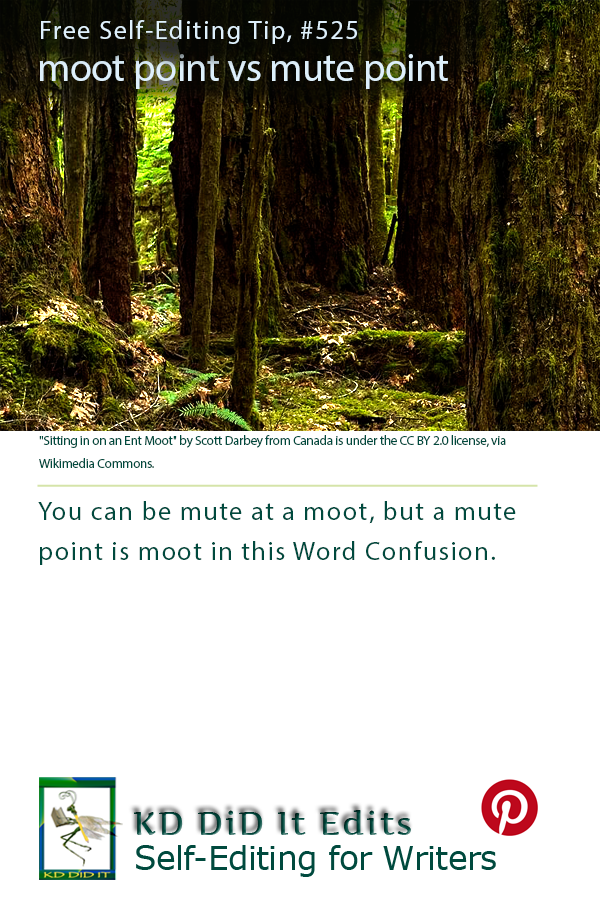Revised as of
21 Sept 2022
I frequently . . . hmmm, not frequently time-wise, but encounter-wise. Most authors who use m— point are using the mute version. And that doesn’t work. Mostly because there is no such phrase, in fact, it’s not even a moot point. So y’all’ll have to stay mute on that point.
Word Confusions . . .
. . . started as my way of dealing with a professional frustration with properly spelled words that were out of context in manuscripts I was editing as well as books I was reviewing. It evolved into a sharing of information with y’all. I’m hoping you’ll share with us words that have been a bête noire for you from either end.
If you found this post on “Moot Point versus Mute Point” interesting, consider tweeting it to your friends. Subscribe to KD Did It, if you’d like to track this post for future updates.
| Moot Point | Mute |
|---|---|
|
Moot Court Hall is Augustus Binu’s own work under the GFDL or CC BY-SA 3.0 licenses, via Wikimedia Commons. |

Schwan is assumed to be by Dickbauch~commonswiki based on copyright claims. It’s under the GFDL or CC-BY-SA-3.0license, via Wikimedia Commons. — Cygnus olor is a mute swan. |
| Part of Grammar: | |
| Adjective 2; Noun 1; Verb 3, intransitive & transitive
Plural for the noun: moots Third person present verb: moots |
Adjective 1; Noun 1, 2; Verb, transitive 1
Plural for the noun and third person present verb: mutes |
| moot point
Adjective: A debatable question, an issue open to argument 2
[Chiefly Law] Not actual
|
Adjective: Refraining from speech or temporarily speechless
[Dated or offensive; of a person] Lacking the faculty of speech [Of a letter] Not pronounced Noun:
A clamp placed over the bridge of a stringed instrument to deaden the resonance without affecting the vibration of the strings
A device on a television, telephone, or other appliance that temporarily turns off the sound A pack of hounds 2 Verb, transitive:
|
| Strictly as moot | |
|
Noun: [Historical] An assembly held for debate, especially in Anglo-Saxon and medieval times 1
[Law] A mock trial set up to examine a hypothetical case as an academic exercise Verb, intransitive:
Verb, transitive: Raise a question or topic for discussion 3
To reduce or remove the practical significance of
[Archaic] To argue a case, especially in a mock court |
|
| Examples: | |
| Adjective: Whether Shakespeare actually wrote the poem remains a moot point among critics. It’s a moot point whether the chicken or the egg came first. Whether the temperature rise was mainly due to the greenhouse effect was a moot point. It is moot whether this phrase should be treated as metaphor or not. Whether that was the cause of their troubles is a moot point. In practical terms, the issue of her application is moot because the deadline has passed. Noun: You guys ready for the moot next week? The Ents in J.R.R. Tolkien’s The Lord of the Rings held their own Ent moot. Verb, intransitive: “And it was they, not the British, who slapped down any suggestion of democratic reform when it was quietly mooted by British colonial officers in the 1950s” (Buruma). Conservatives had shouted down the proposal when it was first mooted. The issue of whether a person’s nature or upbringing is more important continues to be mooted by experts and laymen alike. Verb, transitive: “He looked for an easy way out. A spot in the stateside Guard would have suited him fine; in the event, he dodged and weaved until a low draft number came along to moot his problem” (Hertzberg). “And then the word comes of Ted’s inoperable pancreatic cancer, and death moots the long conflict” (Rhodes). |
Adjective: Irene, the talkative one, was now mute. She gazed at him in mute appeal. The great church was mute and dark. Don’t mind him; he’s mute. A mute e is generally dropped before suffixes that begin with a vowel. Noun: The Ottoman Turks preferred mutes as guards. “The device of using a mute to convey essential facts by dumbshow became a regular feature of melodramas” (Dumbshow). “There would also be fewer professional attendants in a middle-class funeral, perhaps only one mute, the six bearers but no pages” (Kane). In this passage I want the strings to use their mutes with the trumpets using their mutes in the passage that follows. Jen thinks she’s worn down the mute for her sax. She put the remote on mute. The abbot had a mute of hounds. Verb, transitive: He turns the set on, mutes the sound, but flicks through the channels. No, the trumpets are to be muted, not the violins. His professional contentment was muted by personal sadness. |
| Derivatives: | |
| Noun: mooter, mootness | Adjective: muter, mutest Adverb: mutely Noun: muteness |
| History of the Word: | |
|
|
C’mon, get it out of your system, bitch, whine, moan . . . which words are your pet peeves? Also, please note that I try to be as accurate as I can, but mistakes happen or I miss something. Email me if you find errors, so I can fix them . . . and we’ll all benefit!
Satisfy your curiosity about other Word Confusions on its homepage or more generally explore the index of self-editing posts. You may also want to explore Book Layout & Formatting Ideas, Formatting Tips, Grammar Explanations, Linguistics, Publishing Tips, the Properly Punctuated, Writing Ideas and Resources, and Working Your Website.
Resources for Moot Point versus Mute Point
Apple Dictionary.com
Buruma, Ian. “Class Acts.” The New Republic. 24 Sept 2001. Web. n.d. <https://newrepublic.com/article/92620/ornamentalism-david-cannadine>.
Dictionary.com: moot point
“Dumbshow.” Wkipedia.org. Last updated 21 Sept 2022. Web. n.d. <https://en.wikipedia.org/wiki/Dumbshow>.
Hertzberg, Hendricks. Politics: Observations and Arguments, 1966-2004. Penguin Books, 2005. <https://amzn.to/3dyBgyA>, 581.
Kane , Kathryn. “The Regency Way of Death: Furnishing the Funeral.” The Regency Redingote. 19 Oct 2012. Web. n.d. <https://regencyredingote.wordpress.com/2012/10/19/the-regency-way-of-death-furnishing-the-funeral/>.
Merriam-Webster: moot
Rhodes, Richard. “You’re Finally Safe.” Book Review. New York Times. 24 Dec 2000. Web. n.d. <https://archive.nytimes.com/www.nytimes.com/books/00/12/24/reviews/001224.24rhod.html>.
Pinterest Photo Credits:
Sitting in on an Ent Moot by Scott Darbey from Canada is under the CC BY 2.0 license, via Wikimedia Commons.


